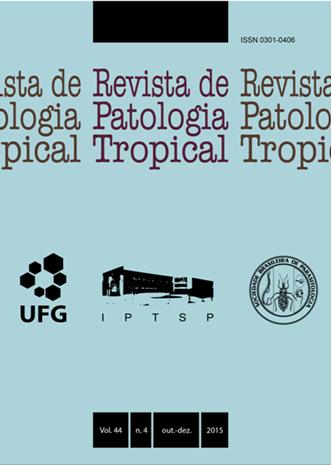EVALUATION OF STREPTOCOCCUS AGALACTIAE CARRIAGE AMONG HIGH RISK PREGNANT WOMEN ATTENDED IN NITERÓI, RJ, BRAZIL
DOI:
https://doi.org/10.5216/rpt.v44i4.39237Keywords:
Pregnant women, Streptococcus agalactiae, colonization, anti-infective agents.Abstract
The aim of this study was to evaluate Streptococcus agalactiae carriage among pregnant women and to investigate antimicrobial susceptibility and capsular types of recovered isolates. A total of 114 pregnant women at high risk attending the prenatal service of the Hospital Universitário Antônio Pedro, Universidade Federal Fluminense, between September 1st, 2013 and August 31st, 2014 were evaluated. Vaginal/rectal secretions, collected by swabs, were cultured and positive cultures were submitted for species identification, antimicrobial susceptibility testing by the disk-diffusion technique and capsular typing by multiplex-PCR. Colonization rate was 6.1%, without significant difference between colonized or uncolonized women regarding age, level of education and previous gestation. On the other hand, absence of bacterial infection at the moment of the specimen collection was significantly associated with S. agalactiae colonization. Isolates were susceptible to ceftriaxone, clindamycin, erythromycin, levofloxacin, penicillin G and vancomycin. Tetracycline resistance was observed in 75% of the isolates. Capsular types found were Ia (50%) and III (50%). Frequency of S. agalactiae carriage was lower than observed in other studies, which may be associated with the population attended at this institution. Bacterial isolates were susceptible to antimicrobials recommended for neonatal infection prophylaxis. These isolates harbored capsular type genetic determinants associated with neonatal infections. Such results corroborate the need for continuous carriage screening, in order to prevent neonatal streptococcal infection.Downloads
Downloads
Published
How to Cite
Issue
Section
License
The manuscript submission must be accompanied by a letter signed by all authors stating the full name and email address, confirming that the material has not been published or is under consideration for publication elsewhere, and agreeing to transfer copyright in all media and formats for Journal of Tropical Pathology. The authors will not be paid for published articles. They are solely responsible for the content of those articles, even if the Editor holds the right to adjust them to the norms of the journal.
The reviewers will not be paid for the peer review process.

